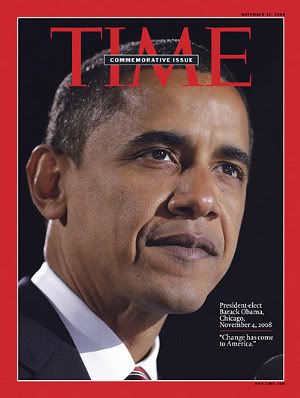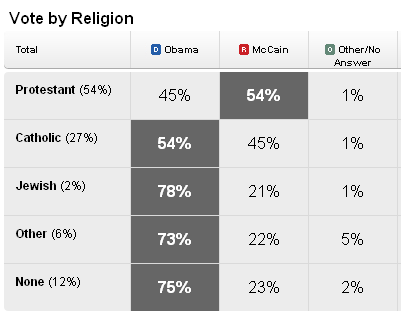With the 2008 Presidential election being, what does a President Obama mean for secularists, non-believers, and church state separation? Well, based on the campaign it doesn’t seem much will change but then again with a more liberal President who hasn’t worn his religion on his sleeve, there is hope for us.
Barack Obama is a Christian – no doubt about that, but he came to religion in the mid 1980’s. His father was an atheist or agnostic and his mother held a detached view of religion.
For my mother, organized religion too often dressed up closed-mindedness in the garb of piety, cruelty and oppression in the cloak of righteousness.
This isn’t to say that she provided me with no religious instruction. In her mind, a working knowledge of the world’s great religions was a necessary part of any well-rounded education. In our household the Bible, the Koran, and the Bhagavad Gita sat on the shelf alongside books of Greek and Norse and African mythology. On Easter or Christmas Day my mother might drag me to church, just as she dragged me to the Buddhist temple, the Chinese New Year celebration, the Shinto shrine, and ancient Hawaiian burial sites. But I was made to understand that such religious samplings required no sustained commitment on my part. Religion was an expression of human culture, she would explain, not its wellspring, just one of the many ways — and not necessarily the best way — that man attempted to control the unknowable and understand the deeper truths about our lives.
In sum, my mother viewed religion through the eyes of the anthropologist she would become; it was a phenomenon to be treated with a suitable respect, but with a suitable detachment as well.
Obama seemed to restate this view in a speech given in 2006 to “Call to Renewal’s Building a Covenant for a New America: conference”:
While I’ve already laid out some of the work that progressive leaders need to do, I want to talk a little bit about what conservative leaders need to do — some truths they need to acknowledge.
For one, they need to understand the critical role that the separation of church and state has played in preserving not only our democracy, but the robustness of our religious practice. Folks tend to forget that during our founding, it wasn’t the atheists or the civil libertarians who were the most effective champions of the First Amendment. It was the persecuted minorities, it was Baptists like John Leland who didn’t want the established churches to impose their views on folks who were getting happy out in the fields and teaching the scripture to slaves. It was the forbearers of the evangelicals who were the most adamant about not mingling government with religious, because they did not want state-sponsored religion hindering their ability to practice their faith as they understood it.
Moreover, given the increasing diversity of America’s population, the dangers of sectarianism have never been greater. Whatever we once were, we are no longer just a Christian nation; we are also a Jewish nation, a Muslim nation, a Buddhist nation, a Hindu nation, and a nation of nonbelievers.
And even if we did have only Christians in our midst, if we expelled every non-Christian from the United States of America, whose Christianity would we teach in the schools? Would we go with James Dobson’s, or Al Sharpton’s? Which passages of Scripture should guide our public policy? Should we go with Leviticus, which suggests slavery is ok and that eating shellfish is abomination? How about Deuteronomy, which suggests stoning your child if he strays from the faith? Or should we just stick to the Sermon on the Mount – a passage that is so radical that it’s doubtful that our own Defense Department would survive its application? So before we get carried away, let’s read our bibles. Folks haven’t been reading their bibles.
This brings me to my second point. Democracy demands that the religiously motivated translate their concerns into universal, rather than religion-specific, values. It requires that their proposals be subject to argument, and amenable to reason. I may be opposed to abortion for religious reasons, but if I seek to pass a law banning the practice, I cannot simply point to the teachings of my church or evoke God’s will. I have to explain why abortion violates some principle that is accessible to people of all faiths, including those with no faith at all.
Sounds like some of the skepticism I experience in my monthly Humanist meetings.
But of course during the campaign, Obama promised to continue and expand Bush’s Faith-Based and Community Initiatives. However he planned to restore the restrictions on proselytizing and job discrimination based on religion that President Bush had relaxed.
Obama opposed California Prop. 8 that banned gay marriage but he felt marriage was between a man and woman. He has said that he supports civil unions but that marriage laws should be decided by the states.
I also think that Obama would be more incline to select a liberal Supreme Court justice should a vacancy come up and that would, at least in the short term, maintain the 5-4 votes that have happened recently on hot button issues. If another vacancy happens then it could tilt the court to a point of view that more strongly supports church state separation. I admit it might be a gamble. But then until there is a viable non-theistic candidate then we need to vote for a believer who will be amenable to our point of view. I think Obama is based on his past speeches and writings.
 Just for your information, here is a graphic showing the percentage of votes by religion. You’ll see that 75% of people reporting no religion voted for Obama. Let’s hope we didn’t make a mistake.
Just for your information, here is a graphic showing the percentage of votes by religion. You’ll see that 75% of people reporting no religion voted for Obama. Let’s hope we didn’t make a mistake.